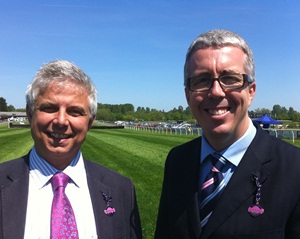The weather remained fantastic all day, with bright blue East Anglian skies illuminating the seemingly endless stretch of Norfolk fields, and it provided me with a welcome break from the stifling humidity of London. Fakenham itself is a wonderful venue, in existence since 1905, and which currently hosts nine National Hunt races. This includes the traditional Easter Monday race. In 2002, work was completed on a new one million pound Members’ Stand named the ‘The Prince of Wales Stand’, and was opened by HRH Prince of Wales himself on March 15th of that year, leading the venue into a new era. My day at Fakenham began with two pony races and in one of them I backed the winner at 9 to 4. It was great to see the bold horsemanship of children aged 9-14 on beautifully turned out ponies.
The striking thing for me was just how much care and attention is put into animal welfare on race days. There are three highly-qualified veterinarians in attendance, brushers at each fence, and a well-drilled, and experienced, managerial team ensuring that high standards, and in particular safety, are at the top of the day’s agenda.
I spent some time speaking to the Chief Executive of Fakenham Racecourse, David Hunter. He explained to me at great length how hot weather makes it very difficult for the racehorses and how, to combat this, Fakenham’s dedicated team of ground staff went to great lengths to ensure that the turf was watered, to pacify on-the-ground running conditions for the horses.
Mr Hunter’s commitment to ensuring that the focus of the day was the welfare of horses demonstrated how seriously the British Horseracing Authority takes this issue. The British public are animal lovers, and they hold a particular place in their hearts for the horse. The BHA is doing everything in its power to minimise racecourse incidents by investing heavily in research, and increasing safety at racecourses. It is important to remember that horseracing is a noble pursuit, and the BHA is making strident efforts to achieve globally-recognised high standards of animal welfare, which I personally as an animal lover find very impressive.
It is important that the British public knows just how much is done to care for, and maintain, high living standards for horses within the racing industry – the Horserace Betting Levy Board’s veterinary programme invests several million pounds every year in research projects to enhance equine health and welfare and the BHA is driving veterinary research standards in the UK to new, unprecedented levels.
At PLMR we understand the way that rural communities work, the pressures they face, and most fundamentally, the commercial importance of horses in these communities. Lisa Bailey’s mother was a farmer, and her father a large-animal vet, complimented by her own degree in Agriculture; Elin Twigge’s family keep sheep and her father is an animal nutritionist and my own family has roots in County Donegal, where horses form a crucial working part of everyday rural Irish life.
I, personally, want us to treasure national institutions such as a family day out to the racecourse, and PLMR is very proud to support the work of vital organisations such as the BHA. A British summer’s day without racing wouldn’t be the same.

Professor Tim Morris, Director of Equine Science and Welfare, BHA and PLMR MD Kevin Craig at Fakenham Racecourse May 27th 2012




